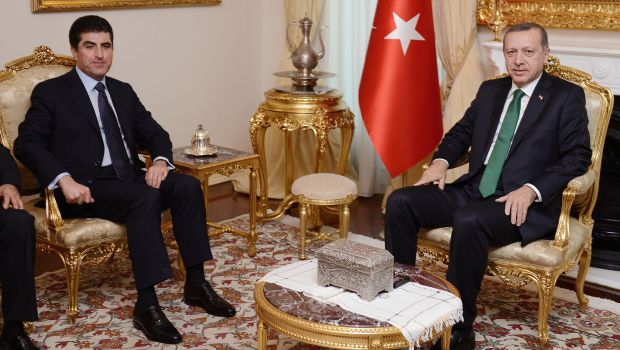
Turkish Prime Minister Recep Tayyip Erdogan, right, and Nechirvan Idris Barzani, head of Regional Government of Iraqi Kurdistan, pose for photographers before a meeting in Ankara, Turkey, Wednesday, Nov. 27, 2013.(AP Photo/Kayhan Ozer, Turkish Prime Minister’s Press Office)
The development comes only days after a visit by Prime Minister of the Kurdistan Regional Government, Nechervan Barzani, to Ankara to discuss cooperation between the two governments.
Meanwhile, Reuters has quoted sources confirming Turkey and the Kurdistan Regional Government have signed a number of agreements which allowed the Kurdistan Regional Government to export oil and gas to the international market through Turkish territory.
The sources added that the agreements were signed during a three-hour meeting between Barzani and Turkish Prime Minister Recep Tayyip Erdoğan, on November 27. The flow of crude oil through the new Kurdish pipeline is expected to start soon and will connect to the existing Kirkuk-Ceyhan pipeline, in order to export oil to international markets.
A Turkish oil company—established by Turkey to operate in Kurdistan—has signed an agreement to explore in 13 fields in northern Iraq, and has agreed to partner with the American oil giant Exxon Mobil in half of those fields.
The contracts also include the building of a new oil pipeline and another for gas, in order to increase Kurdish oil exports to 1 million barrels per day by 2015. The flow of gas is expected to start in 2017.
Kurdish economic expert, Hoshmend Rafiq, told Asharq Al-Awsat that he expected the Kurdistan region to export “150,000 barrels per day in the early stages, and for the export average to reach more than 1 million barrels per day by 2015 and 3 million by 2019.”
According to the agreement, the Kurdistan oil revenue will be deposited in a special account in a Turkish government bank, and once contractors’ fees have been paid, the balance will be held in the account until agreement between Baghdad and Kurdistan on revenue sharing has been reached.
An Iraqi government source, meanwhile, on Saturday announced that Turkish energy minister, Taner Yildiz, will arrive in Baghdad on Sunday to discuss with Iraqi officials ways to find a solution to the dispute over the Kurdish-Turkish agreements.
However, the Iraqi government has announced the suspension of flights between Turkey and the Kurdistan region without explanation. Director of Erbil airport Talar Faiq told Asharq Al-Awsat that “the flights which have been suspended are private flights only and do not include regular flights.”
Faiq said Erbil airport “was not officially informed of the decision” and that “a private medical flight was due in from Turkey on Friday evening but was canceled and all we heard was a verbal decision which said ‘private flights have been suspended until further notice’ without providing any explanation for the surprise decision.”
Faiq did not confirm or deny whether the reasons for the suspension were politically motivated, adding that “everyone was surprised that the airport was not officially informed of the decision to suspend these flights.”
The suspension of flights has cast doubt on whether Yildiz would be able to arrive in Baghdad, and participate in the oil and gas conference planned for Sunday in Erbil.
